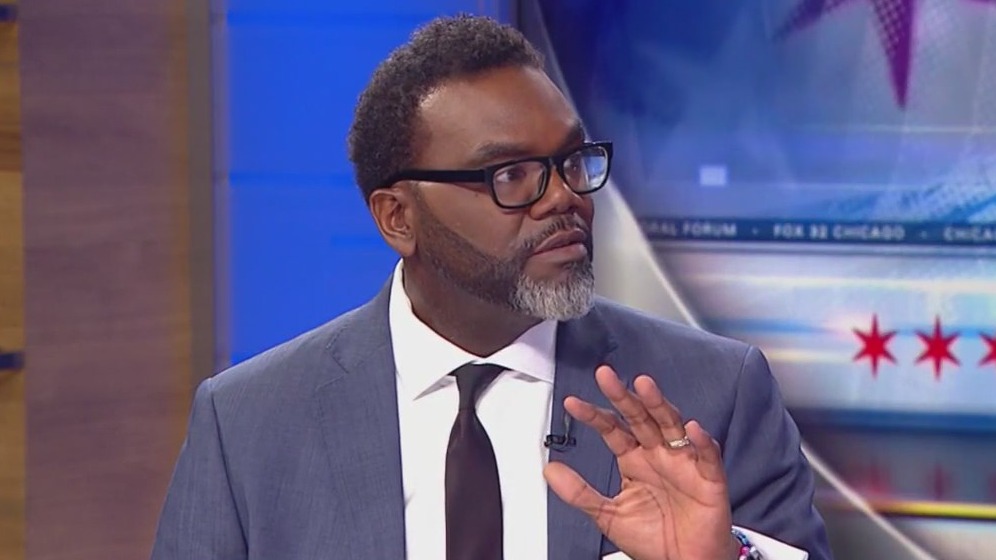Brandon Johnson promises he won’t cut 'one penny' from CPD

New Chicago mayoral poll sheds light on where Vallas, Johnson stand
A new poll just released is painting a clearer picture of which Chicago mayoral candidate may come out on top next week.
CHICAGO - Mayoral challenger Brandon Johnson said Monday he won’t cut "one penny" from the Chicago Police Department’s $1.94 billion budget, reversing previous plans to reduce police spending by $150 million.
Predicting "one of the closest mayoral elections we have ever seen," Johnson used a luncheon address to the City Club of Chicago to shield himself from the two main lines of attack Paul Vallas has used against him: Johnson’s longstanding history of supporting the concept of defunding the police and the $800 million in tax increases he plans to impose to help bankroll the "investments in people" that are the cornerstone of his anti-violence strategy.
Until now, Johnson had pointedly refused to commit to fully funding the CPD’s $1.94 billion budget or filling 1,700 police vacancies. Instead, he vowed to cut the police budget by $150 million, in part by streamlining the number of "non-sergeant" police supervisors, closing CPD’s Homan Square facility and ending the three-year, $33 million ShotSpotter contract.
SUBSCRIBE TO FOX 32 ON YOUTUBE
But with Vallas blanketing the airwaves with commercials featuring Johnson’s past statements about defunding the police, Johnson is refining his message.
"He continues to talk about defunding the police. He knows it’s not true. There are over 3,000 words on my website outlining my approach to public safety for anyone to read. I wouldn’t reduce the CPD budget by one penny," Johnson said, highlighting his plans to promote 200 detectives and "fully fund" a consent decree outlining the terms of federal court oversight over CPD.
"I’m not gonna defund the police. Paul Vallas is lying. He’s lied about everything else so it should not be a surprise to anyone. This is what Republicans do. Republicans said that Governor Pritzker was gonna defund the police. Republicans said that President Biden was gonna defund the police. It’s a lie. It’s a scare tactic. But I’m confident that hope will outweigh fear any day."
As adamant as he now is about police spending, Johnson said there’s wiggle room on the $800 million in tax increases he needs to pay for an array of new social programs to create jobs, build affordable housing, reopen shuttered mental health clinics and improve public schools, public transportation, health and child care.
Johnson’s plan initially included a "Metra city surcharge" to raise $40 million "from the suburbs."

FOX 32 Presents: The Chicago Mayoral Forum with Paul Vallas and Brandon Johnson
Fox 32 News hosts a mayoral forum live with Paul Vallas and Brandon Johnson, the top two vote-getters in the race for mayor of Chicago. Fox 32 political editor Mike Flannery, Scott Schneider and Anita Blanton host the one-hour event.
It still includes taxes on high-end home sales and financial transactions; a revived employee head tax; increased taxes on jet fuel and hotel rooms; and "new user fees for high-end commercial districts frequented by the wealthy, suburbanites, tourists and business travelers.
"I’ve said over and over and over again to anyone who will listen that I’m ready and willing to negotiate the details of the [tax] plan as long as we can agree on the values: eliminate the structural deficit, invest in Chicago and not raise property taxes. Those are my values. We should not have to negotiate our values," said Johnson, who turned 47 Monday.
"Believe that. You know I was raised in a large family [with 10 children] and one bathroom. I’ve got mad negotiating skills. Trust me. Build political alignment with the women in the house."
Johnson reiterated his oft-repeated claim that a "toxic mix of $1.2 billion in property tax, fine and fee increases" is "driving the middle-class" out of Chicago.

Brandon Johnson on improving the communities' relations with police
Brandon Johnson talked about the need to add more detectives to CPD's ranks and the importance of recruiting officers who are passionate to serve their communities.
"If we’re serious about addressing the big issues we are facing in our city — the structural deficit, the housing and transportation crisis, the rise in violent crime — we need to ask ourselves: What are the root causes of the problems we are experiencing? When we get down to it, the root of the problem is always this: We have neglected our people, which is our greatest asset," Johnson said.
"If everyone in the city of Chicago had a job that paid well, could reach those jobs with safe and reliable public transportation, saw futures for themselves and their families and a path to home ownership, even starting a business, do you think we’d be facing this epidemic of crime we see now? We wouldn’t. So why aren’t we doing what works? Why do we continue to refuse to invest in people? Not in a Johnson administration. We’re gonna do what works."

